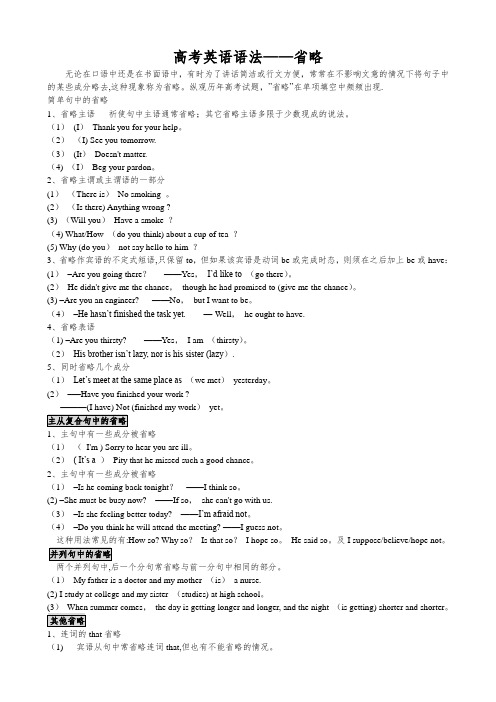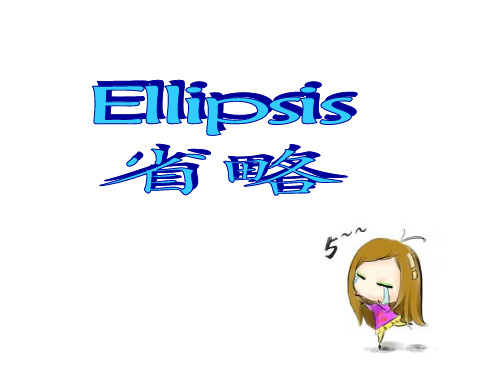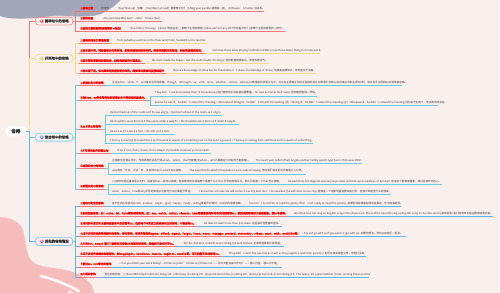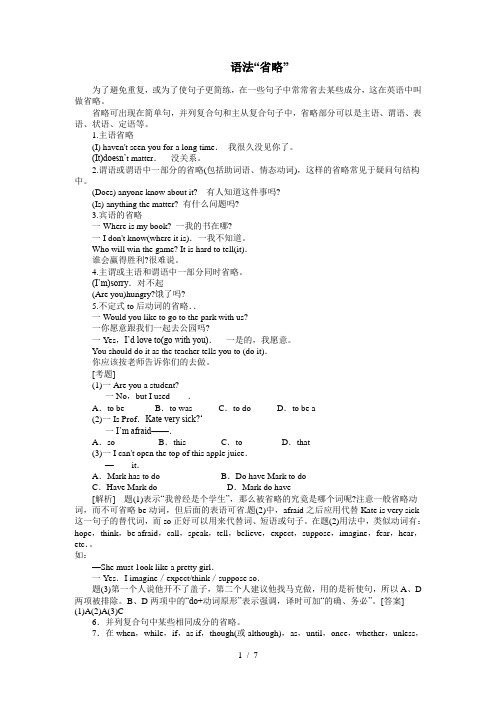高考英语语法-省略
高考英语语法-省略

高考英语语法——省略无论在口语中还是在书面语中,有时为了讲话简洁或行文方便,常常在不影响文意的情况下将句子中的某些成分略去,这种现象称为省略。
纵观历年高考试题,”省略”在单项填空中频频出现.简单句中的省略1、省略主语祈使句中主语通常省略;其它省略主语多限于少数现成的说法。
(1)(I)Thank you for your help。
(2)(I) See you tomorrow.(3)(It)Doesn't matter.(4) (I)Beg your pardon。
2、省略主谓或主谓语的一部分(1)(There is)No smoking 。
(2)(Is there) Anything wrong ?(3) (Will you)Have a smoke ?(4) What/How (do you think) about a cup of tea ?(5) Why (do you)not say hello to him ?3、省略作宾语的不定式短语,只保留to,但如果该宾语是动词be或完成时态,则须在之后加上be或have:(1)–Are you going there?——Yes,I’d like to (go there)。
(2)He didn't give me the chance,though he had promised to (give me the chance)。
(3) –Are you an engineer? ——No,but I want to be。
(4)–He hasn’t finished the task yet. —-Well,he ought to have.4、省略表语(1) –Are you thirsty? ——Yes,I am (thirsty)。
(2)His brother isn’t lazy, nor is his sister (lazy).5、同时省略几个成分(1)Let’s meet at the same place as (we met)yesterday。
高考英语语法知识点归纳总结:省略句

④Child as he is, he knows a lot.
虽然他还是一个孩子,却懂得很多
介词的省略
①both后常跟of短语,其后可以接名词复数形式,也可以接代词宾格复数形式。接复数名词时,介词of可以省略,但接代词宾格时,of不能省略。
②在现在完成时表持续和重复的句型中,一段时间前的介词for可以省略。
这双鞋穿破了,已经穿了很长一段时间了。
③Trees can prevent the earth (from) being washed away.
树能阻止泥土被冲走。
Can you stop him (from) going swimming in the river?
你能阻止他下河洗澡吗?
I have some difficulty (in) answering the question.
约翰一定在踢球,而玛丽一定在做作业。
②His suggestions made John happy, but (his suggestions made) Mary angry.
他的建议使约翰高兴,却使玛丽很生气。
③Old McDonald gave up smoking for a while, but (he) soon returned to his old ways.
有些动词,tell, ask, allow, expect, force, invite, permit, persuade, order, warn, wish, would like,forbid等后跟动词不定式作宾语补足语、主语补足语时,不定式承前省略动词原形,保留动词不定式符号to。
He didn't come, though we had invited him to (come).
高考英语语法:than后的省略

(1) 若than 所连接的两个待⽐较的句⼦有相同成分,通常会有所省略,如说He is much taller than I (am). ⽽不能说He is much taller than I am tall. 但是,若所连接的两个待⽐较的句⼦没有相同成分,则不能省略,否则意思会有所变化。
⽐较: He swims faster than I. 他游泳⽐我(游泳)快。
He swims faster than I run. 他游泳⽐我跑步还快。
(2) 有时⽤于类似以下这样的省略句: Don’t eat more than is good for you. 不要吃得过量。
More food is wasted than is eaten in this canteen. 在这个⾷堂⾥浪费的⾷品⽐吃掉的还多。
Some of the stories were really more than could be believed. 有些故事实在让⼈难以相信。
More people own houses these days than used to years ago. 与⼏年前相⽐,⽬前有更多的⼈⾃⼰有房⼦。
【注】为了便于理解,可以认为这类省略句的than后省略了what(但实际上这个what通常不宜补上,除⾮在英国某些⽅⾔⾥),但也有⼈认为在⼀些类似情况下than有点像关系代词,引导⼀个类似于定语从句的句⼦(但⼜不完全像定语从句,因为有时其前没有先⾏词),这类省略句通常不能补上所缺的主语或宾语(因为than就充当了主语和宾语)。
另外,还有以下这样的省略形式(即不仅省略了主语,⽽且省略了助动词): He returned three days earlier than expected.(=…than he was expected.) 他⽐所预料的早回三天。
高中英语语法-省略句

: Unlesshhee is invited, he won’t come.
: Unlesshe is invited, he won’t come. : Whilehhee is doing house work, my father often listens to music. : While he is doing house work, my father often listens to music.
2、省略主谓或主谓语的一部分。如:
(省略主语和谓语)
: What/How (do you think) about a cup of tea ? : Why (do you) not say hello to him ?
3、省略表语。
: –Are you thirsty? – Yes, I am(.thirsty). : His brother isn’t lazy, nor is his sister(.lazy).
※介词的省略※(考点)
1. 一些常和动名词、形容词一起搭配的介词常省 略,而保留其后的 动名词,常见的句型有
spend/waste time (in) doing, lose no time (in) doing; have difficult/trouble (in) doing; be busy (in) doing; stop/prevent sb. (from) doing 等。
: The order that we(sshhoouuldld) stay where we are is very serious and severe.
: It’s very important that students(shshoouuldld) study hard at school.
【英语知识点】英语省略句语法总结及例句

【英语知识点】英语省略句语法总结及例句英语中的省略是为了避免重复、突出新信息并使上下文紧密连接的一种语法修辞手段。
省略在英语语言中,尤其在对话中,是一种十分普遍的现象。
省略句是英语的一种习惯用法。
1.省略介词:I've studied English (for) five years.我已学五年英语了。
2.省略连词that:I believe (that) you will succeed.我相信你们会成功的。
3.省略关系代词:I'll give you all (that) I have.我要把我所有的一切都给你。
1.省略主语:(You) Open the door,please.请开一下门。
2.省略谓语:Who (es) next?该谁了?3.省略主谓语或主谓语的一部分:(There is) No smoking.禁止抽烟。
4.省略表语:Are you thirsty ? 你30岁了吗?Yes,I am (thirsty).是的,我是。
5.省略宾语:Let's do the dishes. I'll wash and you'll dry(dishes). 让我们洗碗吧,我来洗,你来揩干。
6.省略状语:He was not hurt. (how)Strange! 他没有受伤,真奇怪!7.同时省略几个成分:(I wish) Good luck (to you) .祝你好运/祝你顺利。
1.为避免重复而进行的省略。
当一个句子中有两个或更多相同的词、短语出现时,其中的第一个须保留,其余的往往省略,以达到避免重复、使句子简练的目的。
高考中尤其要注意的情况是:当时间状语从句、地点状语从句、方式状语从句、让步状语从句、条件状语从句等状语从句中的主语与主句的主语一致并含有be时,往往将该状语从句中的主语和be一同省略。
2.语法上的省略。
有些成分的省略是出于语法上的原因——使表述更为简明,例如:He got up at six (o’clock).他六点钟起床。
英语语法---省略

省略1简单句中的省略2并列句中的省略3复合句中的省略4其他的省略情况1.省略主语2.省略宾语3.省略主语和谓语(或谓语的一部分)1.动词不定式的省略2.某些使役动词,如:m a k e,le t,h a v e等和感官动词,如:see,w a t c h,no ti ce,o b ser v e,h ear等后⾯作宾补的不定式须省略t o,但若这些动词⽤于被动语态,则t o不省略。
3.并列的不定式可以省略后⾯的不定式符号t o。
但若两个不定式之间表⽰对⽐关系时,不能省略t o。
4.当不定式在某些动词后作宾语时,常可省略。
常⻅的动词有agree,a ff or d,e xp ec t,f orge t,h o p e,k no w,m anage,p re t en d,re m e mb er,re f use,w an t,wi s h,w oul d l ik e等。
5.介词b u t,e x ce pt (除了) 前有实义动词d o的某种形式时,后⾯的不定式不带t o。
6.当不定式作某些复合谓语时,如b e go i ng t o,b e a b le t o,h a v e t o,oug ht t o,use d t o等,可只保留不定式符号t o。
7.使⽤so,no t等时的省略8.介词的省略(Y ou co m e) Thi s w a y,p lease. 请这边⾛。
(省略了主语和谓语) (Ha v e y ou) G o t an y i n k? 你有墨⽔吗?(省略了主语和谓语的一部分)常⻅的结构有: (1)h a v e diffi cul ty/t rou b le (i n) d o i ng s th. (2)b e b us y (i n) d o i ng s th. (3)s p en d so m e tim e (i n) d o i ng s th. (4)s t o p/p re v en t s b. (f ro m) d o i ng s th. Th e h ea vy ra i n p re v en t e d him (f ro m) arr ivi ng th ere on tim e.—Can y ou fi n i s h y our w or k t o d a y? —I thi n k so./I d on’t thi n k so./I thi n k no t. ——你今天能完成⼯作吗? ——我认为能。
高中英语语法省略句

有时整个主句都可省略, 这种 省,略通出现在简短答中。
---Are you going to buy the house? ---Unless my wife objects.
---You all like the story? ---yes, except that the end is
too surprising.
Ellipsis
省略句
1.简单句中的省略现象 1)句首省略
省略了句子的主语,有时还连 同谓语动词一起省略
•Sounds like a good idea. •Pity we live so far from the sea. •Beautiful day, isn’t it?
Wonder what she is doing. Forgotten my name? Nobody at home. 2)答语的省略(注意)
15. Tom was attacked by cramp while _____s_w_i_m(smwiinmg) across the river.
16. —Have you ever been to the
seaside?
(语法填空)
—No, we can’t afford__to___.
17. When first i_n_t_r_o_d_u_c_e_d (introduce)
在than或as引起的从句中的省略
•Many others are doing better than we are. •He works harder than ever. •Jane is as tall as I. •They will try to put the plan into practice as quickly as possible.
语法“省略”

语法“省略”为了避免重复,或为了使句子更简练,在一些句子中常常省去某些成分,这在英语中叫做省略。
省略可出现在简单句,并列复合句和主从复合句子中,省略部分可以是主语、谓语、表语、状语、定语等。
1.主语省略(I) haven't seen you for a long time.我很久没见你了。
(It)doesn’t matter.没关系。
2.谓语或谓语中一部分的省略(包括助词语、情态动词),这样的省略常见于疑问句结构中。
(Does) anyone know about it? 有人知道这件事吗?(Is) anything the matter? 有什么问题吗?3.宾语的省略一Where is my book? 一我的书在哪?一I don't know(where it is).一我不知道。
Who will win the game? It is hard to tell(it).谁会赢得胜利?很难说。
4.主谓或主语和谓语中一部分同时省略。
(I’m)sorry.对不起(Are you)hungry?饿了吗?5.不定式to后动词的省略..一Would you like to go to the park with us?一你愿意跟我们一起去公园吗?一Yes,I’d love to(go with you).一是的,我愿意。
You should do it as the teacher tells you to (do it).你应该按老师告诉你们的去做。
[考题](1)一Are you a student?一No,but I used____.A.to be B.to was C.to do D.to be a(2)一Is Prof.Kate very sick?‘一I’m afraid——.A.so B.this C.to D.that(3)一I can't open the top of this apple juice.—____it.A.Mark has to do B.Do have Mark to doC.Have Mark do D.Mark do have[解析] 题(1)表示“我曾经是个学生”,那么被省略的究竟是哪个词呢?注意一般省略动词,而不可省略be动词,但后面的表语可省.题(2)中,afraid之后应用代替Kate is very sick 这一句子的替代词,而so正好可以用来代替词、短语或句子。
- 1、下载文档前请自行甄别文档内容的完整性,平台不提供额外的编辑、内容补充、找答案等附加服务。
- 2、"仅部分预览"的文档,不可在线预览部分如存在完整性等问题,可反馈申请退款(可完整预览的文档不适用该条件!)。
- 3、如文档侵犯您的权益,请联系客服反馈,我们会尽快为您处理(人工客服工作时间:9:00-18:30)。
高考英语语法——省略无论在口语中还是在书面语中,有时为了讲话简洁或行文方便,常常在不影响文意的情况下将句子中的某些成分略去,这种现象称为省略。
纵观历年高考试题,"省略"在单项填空中频频出现。
简单句中的省略1、省略主语祈使句中主语通常省略;其它省略主语多限于少数现成的说法。
(1) (I) Thank you for your help.(2) (I) See you tomorrow.(3) (It) Doesn ’t matter.(4) (I) Beg your pardon.2、省略主谓或主谓语的一部分(1) (There is) No smoking .(2) (Is there) Anything wrong ?(3) (Will you) Have a smoke ?(4) What/How (do you think) about a cup of tea ?(5) Why (do you) not say hello to him ?3、省略作宾语的不定式短语,只保留to,但如果该宾语是动词be 或完成时态,则须在之后加上be 或have:(1) –Are you going there? --Yes, I ’d like to (go there).(2) He didn ’t give me the chance, though he had promised to (give me the chance).(3) –Are you an engineer? --No, but I want to be.(4) –He hasn ’t finished the task yet. --Well, he ought to have.4、省略表语(1) –Are you thirsty? --Yes, I am (thirsty).(2) His brother isn ’t lazy, nor is his sister (lazy).5、同时省略几个成分(1) Let ’s meet at the same place as (we met) yesterday.(2) –-Have you finished your work ?---(I have) Not (finished my work) yet.主从复合句中的省略1、主句中有一些成分被省略(1) ( I ’m ) Sorry to hear you are ill.(2) ( It ’s a ) Pity that he missed such a good chance.2、主句中有一些成分被省略(1) –Is he coming back tonight? --I think so.(2) –She must be busy now? -- If so, she can ’t go with us.(3) –Is she feeling better today? --I ’m afraid not.(4) –Do you think he will attend the meeting? --I guess not.这种用法常见的有:How so? Why so? Is that so? I hope so. He said so. 及I suppose/believe/hope not.并列句中的省略两个并列句中,后一个分句常省略与前一分句中相同的部分。
(1) My father is a doctor and my mother (is) a nurse.(2) I study at college and my sister (studies) at high school.(3) When summer comes, the day is getting longer and longer, and the night (is getting) shorter and shorter.其他省略1、连词的that 省略(1) 宾语从句中常省略连词that,但也有不能省略的情况。
(2) 在定语从句中,that 在从句中作宾语时可省略.另外,凡是进行时态和被动语态的定语从句都可省略关系代词和be 动词。
2、在某些状语从句中,从句的主语与主句的主语一致时,可省去“主语+be”部分(1) When (he was) still a boy of 10, he had to work day and night.(2) She tried her best though (she was) rather poor in health.(3) If (you are) asked you may come in.(4) If (it is) necessary I ’ll explain to you again.状语从句的省略原则主要是:如果从句中的主语和主句中的主语一致,就可以经过一定的变动把状语从句中的主语和谓语的一部分或全部省略,从而使语言更加简洁、明了。
现就把各种状语从句的省略。
现象列举如下:一、时间状语从句中的省略When (she was) very young, she began to learn to play the piano.她很小时,就开始学习弹钢琴。
While (I was) at college, I began to know him, a strange but able student.我在上大学时就开始认识他,一个奇怪但有能力的学生When arriving, send me a telegram. (When you arrive, send me a telegram.)到达之后,来个电报Don’t come in until (you are) asked to.不叫你请你不要进来Whenever (it is )possible, you should come and help.不管什么时候只要有可能就来帮忙。
You should let us know the result as soon as(it is) possible.你应尽快让我们知道结果。
注:as在引导时间状语从句时,没有这种省略现象。
我们不可说As walking, she found a nice shining thing on the ground.二、地点状语从句中的省略. 地点状语从句的省略常用下列结构:where(ver) possible, where(ver) necessary,Lay these books where possible you can find them easily. 把这些书放在你可能容易找到的地方。
Put in articles wherever necessary in the following passages.在下列文章中需要的地方填入冠词三、条件状语从句中的省略常用的句型是:if necessary, if possible, if true, if anyone 等。
如:Send the goods now if (they are) ready.货物如果准备好了,请送过来。
He will come if (he is) asked. 如果叫他来,他就来If (it is) necessary, ring me at home.如果有可能,朝我家里打电话。
Come along with me if (it is) possible.如果有可能和我一起去吧。
If (it is) true, this will casue us a lot of trouble.如果是真的,这会给我们带来很多麻烦。
There are few people nowadays, if (there are) any, who remember him. 很少有人能记起他。
You should stay where you are, unless (you are) asked to leave. 。
四、让步状语从句中的省略He is a good man, though sometimes (he is) rather dull. 他真是个好人,尽管有时有点无聊。
Even if (I am ) invited to, I won ’t go to such a 即b a使d l邀ec我tu去r e.,我都不想听如此坏的报告五、比较状语从句中的省略She can play the piano just as wonderfully as you (do). 她钢琴弹的我你弹的一样好。
She has finished the work earlier than (it has been) expected. 她这项工作比预料的提前完成六、方式状语从句中的省略as if/as though 后还可加n./a./ad./介词短语/现在分词/过去分词/不定式。
He acts as if (he were) a fool. 他的行为举止好象是个傻子。
She talked to the stranger as if (she were) absent-minded. 她和陌生人谈话似乎很不在意。
He opened the desk, as if (he was) in search of something important.他打开抽屉仿佛要找一件什么重要的东西。
The boy is running impatiently here and there as if (he is) searching for something lost on the sports ground. 这男孩很不耐心地在操场上到处跑着仿佛在找什么东西。
The football player is rolling on the ground as if (he is) hurt badly in the leg.足球运动员在操场上打着滚似乎他的腿伤得厉害。
He moved his lips as if (he wanted )to speak. 他的嘴动着仿佛要说什么。
3、不定式符号to 的省略(1) 并列的不定式可省去后面的to.I told him to sit down and wait for a moment.(2) help 当“帮助”讲时,后面的宾语或宾补的不定式符号to 可带可不带.I will help (to) do it for you.I will help you (to) do it.(3)介词but 前若有动词do,后面的不定式不带to.The boy did nothing but play.(4) 某些使役动词(let, make, have)及感官动词(see, watch, hear, notice, observe, feel, look at, listen to 等)后面作宾语补足语的不定式一定要省去to, 但在被动语态中须将to 复原。
